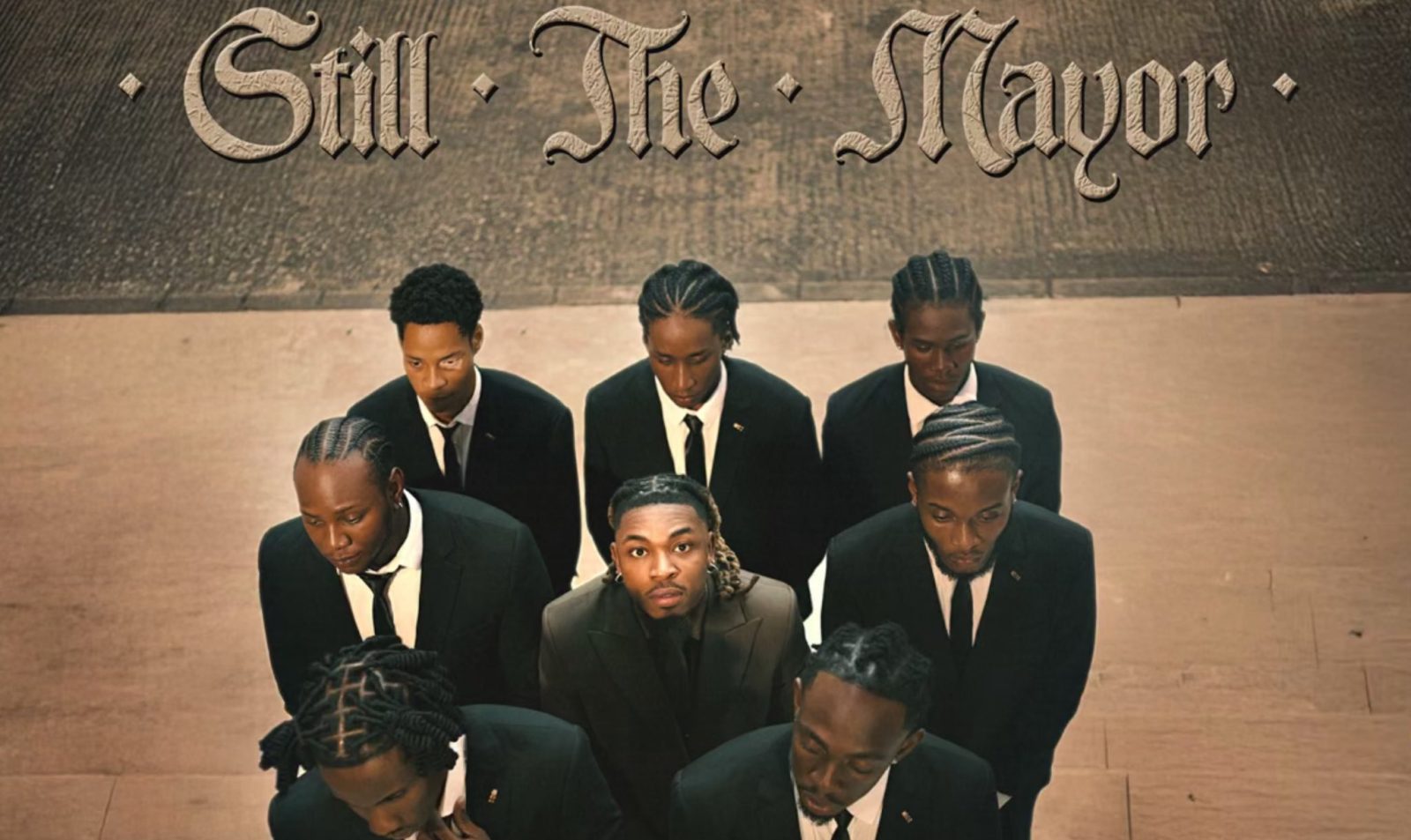Still The Mayor is, at its core, Mayorkun reminding us why he earned the title in the first place.
By Abioye Damilare Samson
Since 2016, when Mayorkun slipped into public consciousness with the bright, bouncy “Eleko”, a song that followed a viral cover and a life-changing co-sign from Davido, he has established himself as one of Afro-Pop’s most bankable stars. With a voice made for easy melody and a pen drawn to cheeky rhymes, he has spent the better part of the last decade crafting songs that have become undeniable hits.
Following a run of successful singles, he released his debut album, The Mayor of Lagos, which arrived at the tail end of 2018 with a title that felt equal parts self-mythologising and self-assured. To call yourself the “Mayor” of Africa’s most chaotic and culturally influential city is no small claim. But like Fela’s ‘Abami Eda’ or Burna Boy’s ‘African Giant’ , it spoke to the confidence of an artiste trying to carve out a myth around his name, one whose talent had backed it up well enough to now return with a new third album boldly titled Still The Mayor.
By 2020, he had entered a different mode, a hot streak of features and solo records that cemented his presence in the culture. It was the kind of run that could only have come from an artiste in full stride. He even quipped, “I held down the lockdown for a long time”, on the title track of his 2021 sophomore album Back In Office. In 2023, he followed up with the five-track EP, Love.. For Free, a stopgap project meant to keep the energy alive and satisfy fans craving more of his sound.
Now, four years after his last full-length album, Mayorkun returns with a new album, Still The Mayor, a title that carries that same thread of self-assurance that the crown still fits even as the soundscape around him has evolved. In the lead-up to the album, he dropped “Innocent” with Fireboy DML in the tail end of 2024, a sleek Afro-Pop tune with crisp melodies and tightly wound hooks, and followed it up in 2025 with the escapist anthem “Reason to Japa”.
Still The Mayor’s opener, “Keep On Rockin’”, immediately reintroduces the version of Mayorkun that listeners have come to love: witty, rhythmically sharp, and endlessly charismatic. Built on an interpolation of Yinka Ayefele’s “Beru ba monuro” from his 2005 Fulfilment album, and borrowing the melodic contour of Sean Kingston’s 2007 hit “Beautiful Girls”, the track is a reminder of Mayorkun’s brilliance as an artiste who knows how to draw from seemingly disparate references to craft something fresh and riveting.

On the pre-released “Innocent”, Mayorkun teams up with Fireboy DML for a sultry, tightly-wound Afro-Pop number that thrives on sexual hedonism. Both artistes bring their A-game, trading sleek verses and stitching together a magnetic hook that rewards repeat listens.
It’s hard to overpower Mayorkun in a collaboration whether he’s the featured act or the main artiste. Just like on “3:45”, which features Nigerian-American singer, Rotimi, Mayorkun’s hook steals the spotlight. “Baby baby ye/ It’s 3:45, everything dey go slow (hey)/ I’m gonna need your postcode (hey)/ Make we link for Tokyo oh (iyee)”, he sings.
On their second collaboration, “Diamond”, Mayorkun and Fireboy glide over a vibrating R&B track anchored by a hard-hitting bass line that adds a sensual thrill. But despite all the energy Mayorkun brings on his verse, it’s Fireboy’s chorus and verse that carry the emotional weight of the song.
On “Konko Below”, a title that pays homage to Lagbaja’s 2000 classic from his We Before Me album, Mayorkun puts a contemporary spin on the legacy. While Lagbaja’s original thrives on Afro-Jazz arrangements and earthy percussion, Mayorkun’s version is slick and groovy, powered by a playful call-and-response structure: “Little cash she dancing psycho ko (psycho ko ko ko)/ Me na boss I give you jairo ro (jairo ro ro ro)/ Come see Sikiratu Sindodo (sindodo do do)”.
On the Hip-Hop-charged “Interlude (Industry Girls)”, Mayorkun teams up with Dremo, The Flowolf, and Michii for a gritty, tongue-in-cheek cypher. Over bouncing drums and playful bars, they trade verses narrating the escapades of a seductive and elusive woman they all refer to as the “Industry Girl”.
There have been many Davido and Mayorkun collaborations over the years, and each one seems to reaffirm their undeniable chemistry. On “Blessings On Blessings”, Mayorkun taps Davido once again over a 120+ BPM, fast-paced percussion-driven beat where both artistes exchange verses in celebration of their wealth and wins. It’s the kind of track that thrives on charged lyricism, kinetic flows, and the unmistakable pull of two hitmakers with voices in sync.

In a rare turn toward conscious music, Mayorkun addresses the everyday frustrations of living in Nigeria on “Japa”. Over a bouncy instrumental that contrasts its bleak subject matter, he voices the desperation many young Nigerians feel that the only perceived way out is to leave. “The government make everything tire me/ I dey reason to japa/ From sapa mo sapa/ What be the matter?”, he sings.
The log-drum-powered collaboration with King Promise is another love song, but one that is wrapped in longing and emotional vulnerability. Both artistes express a desire to impress and hold on to a partner, hinting at a connection that feels intense and on the verge of slipping away.
There’s a subtle ache beneath the breezy Amapiano production, made especially clear when King Promise sings, “Lately I’ve been overthinking / Are we really living this? / Are we lying to ourselves?”.
The Adiba-produced “Woman” sees Mayorkun shift into a slower gear, offering a tender love song that, while sincere in its intent, lacks the resonance of the album’s stronger moments and ultimately plays like filler. That emotional love sincerity is better channelled on “Would You”, where Olivetheboy’s sticky hook injects a burst of energy into a track about romantic assurance.
Mayorkun closes Still The Mayor on a high note with “Jiggy”, a reaffirmation of his self-appointed status. “You know I’m still the mayor/ Run wan leti like tailor/ Bad energy can fade off”, he sings, leaning into braggadocio and sending a clear message to those who have doubted his staying power. It’s a closing statement from an artiste who knows exactly what he’s built and isn’t ready to give up his seat just yet.
That legacy, however, has largely been shaped outside the bounds of full-length projects. Mayorkun has always felt like a singles artiste whose brand has been shaped less by cohesive albums and more by a steady stream of chart-ready hits. From “Mama” to “Geng” to “Certified Loner”, his biggest moments often exist outside the frame of his full-length projects. As a result, his LPs sometimes feel like collections of strong individual tracks without always delivering a clear narrative or sonic throughline.

Still The Mayor, for all its strong moments, occasionally falls into that same pattern. As with any artiste who’s spent nearly a decade in the mainstream, some parts of the project feel like Mayorkun is trying to catch up with himself and realign his “Mayor” myth with the moment.
Not every song lands with equal impact, and there are moments where the polish outshines the personality. But when Still The Mayor does hit its stride, especially in songs like “Innocent”, “3:45”, “Blessings On Blessings”, and “Would You?”, it serves as a compelling argument that Mayorkun still understands the nuances of Pop music: timing, tone, and texture.
Still The Mayor is, at its core, Mayorkun reminding us why he earned the title in the first place. And in an industry that prizes constant reinvention, sometimes the boldest move is to simply say, “I’m still here”. And that’s what this album does.
Lyricism – 1.5
Tracklisting – 1.1
Sound Engineering – 1.2
Vocalisation – 1.7
Listening Experience – 1.5
Rating – 7.0/10
Abioye Damilare Samson is a music journalist and culture writer focused on the African entertainment Industry. Reading new publications and listening to music are two of his favourite pastimes when he is not writing. Connect with him on Twitter and IG: @Dreyschronicle



